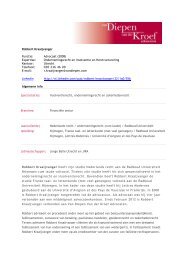Writ of summons - Van Diepen Van der Kroef
Writ of summons - Van Diepen Van der Kroef
Writ of summons - Van Diepen Van der Kroef
Create successful ePaper yourself
Turn your PDF publications into a flip-book with our unique Google optimized e-Paper software.
the Netherlands acted in an unlawful manner towards Plaintiff and her mur<strong>der</strong>ed family.The UN and the State <strong>of</strong> the Netherlands also acted unlawfully towards the personswhose interests are promoted by Foundation.299. Before elaborating on the claims, it is necessary to determine which law is applicable.This question is divisible in two parts, namely, the law applicable to the failure to fulfillobligations arising from agreement (non-performance) and the law applicable to theacting in an unlawful manner. Plaintiff and Foundation will now go into these two partsin greater detail.II.3.a. Law applicable to the agreement300. Plaintiff and Foundation note that the issue whether an agreement was concluded(between Plaintiff and the UN, and the State <strong>of</strong> the Netherlands, respectively), is, byvirtue <strong>of</strong> Article 8 paragraph 1 EEC Convention on the Law applicable to ContractualObligations (hereafter: Rome Convention), governed by the law (<strong>of</strong> the country) that isapplicable, if the contract were to be valid. The law applicable to the creation <strong>of</strong> anagreement is consequently the same as the law (<strong>of</strong> the country) that is applicable to theassessment <strong>of</strong> the breach <strong>of</strong> contract. In the interest <strong>of</strong> completeness Plaintiff points outthat despite the fact that Bosnia-Herzegovina is not a member <strong>of</strong> the EU, the RomeConvention has universal force on the ground <strong>of</strong> Article 2 Rome Convention and thattherefore the Dutch court must apply the Rome Convention. To the extent that the RomeConvention is not directly applicable to the UN, it should be applied mutatis mutandis inthe present case.301. The question which law is applicable to the agreement (and with that to the creation <strong>of</strong>the agreement and to the non-performance), is, in the absence <strong>of</strong> a choice <strong>of</strong> law,answered on the basis <strong>of</strong> Article 4 paragraph 1 Rome Convention. That Article refers tothe law <strong>of</strong> the country with which the case is the most closely connected. On the ground<strong>of</strong> Article 4 paragraph 2 Rome Convention that is presumed to be the country <strong>of</strong> theparty who effects the most characteristic performance. In that regard Plaintiff will brieflyset out which obligations arising from agreement were entered into by the UN and theState <strong>of</strong> the Netherlands.© <strong>Van</strong> <strong>Diepen</strong> <strong>Van</strong> <strong>der</strong> <strong>Kroef</strong> Advocaten 2007www.vandiepen.com130
















